(完整版)九年级英语上册第一单元知识点总结
九年级英语上册重要知识点总结

九年级英语上册重要知识点总结Document serial number【NL89WT-NY98YT-NC8CB-NNUUT-NUT108】九年级英语上册第一单元重要知识点总结九年级英语上册第一单元重要知识点总结Unit1一、知识点:在旅馆的登记入住。
ut:在旅馆结账离开。
2.By:①通过…..方式(途径)。
例:IlearnEnglishbylisteningtotapes.②在…..旁边。
例:bythewindow/thedoor③乘坐交通工具例:bybus/car④在……之前,到……为止。
例:byOctober在10月前⑤被例:Englbymanypeople.3.how与what的区别:how通常对方式或程度提问,意思有:怎么样如何,通常用来做状语、表语。
what通常对动作的发出者或接受者提问,意思为什么,通常做宾语,主语。
①Howisyoursummerholiday?It’sOK.(how表示程度做表语)②Howdi dyoutravelaroundtheworld?Itravelbyair.③Whatdoyoulearnatschool?IlearnEnglish,mathandma ubjects.①What……?How…like…?②What…dowith…?How…dealwith…?③What…likeabout…?How…like…?④What’stheweatherliketoday?How’stheweathertod ay?⑤Whattodo?Howtodoit?e.g.Whatdoyoubook?=Howdoyoulbook?Idon’tknowwhatIshoulddowatter.=Idon’tknowhowIs houlddealwWhatdoyoulikeaboutChina?=Howdoyoula?Idon’tknowwhattodonextstep?=Idon’tknowhowtodoi tnextstep?㊣Whatgood/badweaday!(weather为不可数名词,其前不能加a)㊣Whatafine/baddaday!(day为可数名词,其前要加a)4.aloud,loud与loudly的用法:三个词都与"大声"或"响亮"有关。
九上英语unit1知识点总结

九上unit1知识点总结一、重点短语:1、eat up 吃完,吃光2、be curious about 对…感到好奇3、keep…in order 使…保持井然有序4、show off 炫耀5、come up with 想出(主意)6、n either…nor… 既不…也不…7、impress sb with sth 用…给某人留下印象8、win high praise 赢得高度赞扬9、sales department 销售部10、general manager总经理11、in general 总的来说12、e ither…or… 不是…就是… 13、take the lead 处于领先地位14、fall behind 落后15、take on new challenges迎接新的挑战16、chief engineer总工程师17、the high-speed railway高铁18、connect to/with与…连接19、as good as 和…几乎一样简直是20、pay attention to 注意21、work to high standards以高标准工作22、a pioneer heart surgeon 心脏外科先锋23、work extra hours 加班几个小时24、be suitable for… 适合于…25、b e impatient with… 对…没有耐心26、think twice(about sth) 三思而行27、do the dishes 洗碗28、lunar calendar 阴历,农历29、animal sign 生肖30、in all 总共,总计31、star sign 星座32、d ivide…into… 把…分成…33、make a speech 发表演讲34、be absent from… 缺席…35、agree with sb/ agree to do sth 同意某人看法/ 同意做某事36、all day long 一整天37、search for 搜寻38、be easy to work with容易共事39、can’t be too…再…也不为过40、n ot only…but (also)…不仅…而且…41、I t is said that… 据说42、t hat’s not the case事实并非如此二、重要用法总结:1、create (v.)创造-----creative(adj.) 有创造力的energy(n.)能量、能源-----energetic(adj.)精力充沛的organize (v.)组织---organized (adj.)有条理的--organization (n.)组织born (adj.) 天生的-----birth (n.) 出生careful (adj.)细心的-----careless (adj.)粗心-----carelessness (n.)粗心patient(adj.)有耐心的-----(反义词)impatient没有耐心的2、pay attention to doing sth 注意做某事3、devot sth to sth/doing sth 把…贡献于…/致力于做某事4、without doing sth 没有做某事5、give up doing sth 放弃做某事6、start/begin to do sth , start/begin doing sth 开始做某事7、be ready to do sth准备做某事be willing to do sth 乐意做某事8、can’t afford to do sth负担不起做某事三、重点语法:1、并列连词and 、but 、or、so①and表示并列关系,译为“和,又”(在否定句中并列成分通常用or连接,而不用and)②but表示转折关系,译为“但是”,所连接的成分意思往往相反或相对。
九年级英语上册各单元知识点归纳

九年级英语上册各单元知识点归纳第一单元:基础知识1. 介词短语的使用:介词短语是由一个介词和它的宾语组成的短语,用来表示时间、地点、方向、原因等。
例如:"on the table"(在桌子上),"in the park"(在公园里)。
介词短语在句子中作状语、定语、宾语等。
需要注意介词与宾语之间的搭配。
2. 动词的时态和语态:英语中的动词有多种时态和语态。
常见的时态有一般现在时、一般过去时、一般将来时等。
常见的语态有主动语态和被动语态。
时态用于表示动作发生的时间,语态用于表示动作的执行者。
例如:"She is reading a book."(她正在读一本书)。
需要注意时态和语态的用法和变化规则。
3. 名词的单复数形式:英语中的名词有单数和复数形式。
复数形式一般是在名词后面加-s或-es。
有些名词的复数形式较特殊,需要记忆。
例如:"a cat"(一只猫)的复数形式是"cats"(多只猫)。
需要注意名词的单复数形式在句子中的搭配和用法。
第二单元:阅读理解1. 完型填空:完型填空是一种考察学生对语境理解和词汇运用能力的题型。
在完型填空中,通常给出一篇文章和一些空格,要求学生根据文章内容和语境选择正确的单词或短语填入空格中。
通常需要结合文章整体逻辑和上下文意义来填写正确答案。
2. 阅读理解题:阅读理解题是一种考察学生阅读理解能力和推理能力的题型。
通常会给出一篇短文或文章,然后根据文章内容提出一些问题,要求学生根据文章内容和推理来回答问题。
需要学会熟练阅读和理解文章,抓住关键信息和主题,并能运用推理等能力来回答问题。
第三单元:语法知识1. 直接引语和间接引语:在英语中,当我们引述别人的话时,可以使用直接引语和间接引语。
直接引语是直接引用别人所说的话,使用引号将其包围;间接引语是将别人所说的话转述出来。
例如:直接引语:"I am happy," she said.(她说:“我很开心。
九年级上册英语语法知识点总结

九年级上册英语语法知识点总结Unit 1Topic11 it’s + adj +to do sth. 做、、、是…样的2 come back from 从、、、回来3 take place 发生4 more and more 越来越多5 have been to 去过、、、6 have gone to 去了、、、7 take photos 照相8 take part in 参加9 have no time to do没时间做、、、10 in detail 详细的11 in order to 为了12 afford 负担得起support支持13 get a good education 受好教育14 see …oneself亲眼所见15 have a chance to do 16有机会做、、、16 Keep in touch with保持联系17 far away 远离18 reform and opening-up改革开放19 not only …but also 不但而且20 make rapid progress取得巨大进步21 prefer A to B更喜欢A22 现在完成时结构:肯:S+ have\has +动分否:S+ have\has + not +动分疑:Have\has+S+动分答:Yes, S+ have\has No, S+ haven’t\hasn’tUnit 1Topic21 get lost;走失,迷路2 so do I .我也如此否:neither +be\do\情态动词+主语so +主语+ be\助动词\情态动词(表达两者对同一事物的看法) A 如此,A的确如此3 it seems that+从句4 population 人口,居民常用large或small来修饰5 happen 碰巧发生, 指偶6 take the place of代替、、、的位置7because 因为,连接从句because of +n.\v-ing 短语8 be strict with sb 对某人要求严格be strict in(doing )sth 对做某事要求严格9increase by 表示:增加了、、、10increase to+具体的增长后的数字11 反义疑问句:前肯后否,前否后肯12 carry out 实行,进行,执行13 What’s the population of...?=What’ the number of the people in ...?14one child policy 独生子女政策15developing country发展中国家16 developed country 发达国家17数字的读法来试着总结一下: 1)三个数字为一组 2) 百位和十位之间用and连接(如果没有十位,百位和各位之间也用and连) 2)thousand (三位数前)million(六位数前)billion (九位数前)18cause;引起,导致=bring about19分数:母序子基,分子大于1,分母加s四分之一亦作:a quarter 二分之一亦作:a half20be short of 缺乏21be short for 是、、、的缩写22be known as =be famous as作为、、、而闻名23be famous for因为、、、而闻名 be famous in 在、、方面而闻名24work well in doing sth.做的好25take measures to do sth. 采取措施做某事26 offer to do sth. 主动提出要做某事 offer sb sth 给某人提供某物27prefer: 更喜欢1)preferA toB 和A比较更喜欢B2) prefer doing sth. 更喜欢做某3)prefer to do rather than do sth.宁愿而不28 called =named= with the name of 叫做29 unless 除非,如果不= if not30 a couple of 一对,一双,夫妇31 a place of interest一处名胜32现在完成时态二:1现在完成时不能和明确的表示过去的时间状语联用,如:yesterday, last week, in 1999等,它们适用与一般过去时。
(完整版)九年级英语第一单元知识点归纳总结-打印

九年级英语第一单元知识点归纳总结短语归纳Section A Section B1. work with friends 与朋友学习/工作2. make words cards 制作单词卡3. read the textbook 读课本4. listen to tapes 听磁带5. ask sb. for help 向某人寻求帮助6. study for a test 为考试而学习7. learn a lot/ a little 学到许多/一点8. work/study with a group 小组学习9. watch videos 看录像10. have/ make a conversation with sb. 和某人谈话/对话11. read aloud 大声朗读12. be patient 耐心点be patient with sb. 对某人有耐心be patient of sth. 对某事有耐心反义词:impatient13. practice sth. / doing sth. 练习某事/做某事14. in that way 用那种方式15. improve my speaking skills提高我的说的技能speaking/reading/writing/listening skills口语/阅读/写作/听力技能16. spoken English 英语口语written English 英语书面语17. a little nervous 有点紧张18. finish sth. /doing sth. 完成某事/做完某事finish reading a book 读完一本书19. give a report 作报告20. a very slow reader 一个读书很慢的人21. get the main ideas 理解/弄清大意1. pronounce some the words读某些单词2. understand spoken English 明白英语口语3. increase to/by 增加到/了4. at the speed of ……的速度at full speed 全速increase my reading speed 提高我的阅读速度5. spell English words 拼写英语单词6. make mistakes in sth. 在某方面犯错误make mistakes in grammar 在语法方面犯错误mistake sb. for sb. 错把某人当成他人mistake sth. for sth. 错把某物当成他物by mistake 错误地7. get the pronunciation right 使发音正确;正确地发音8. get much writing practice 作许多写作练习9. join an English language club加入英语俱乐部10. have a partner to practice English with有一个练习英语的伙伴11. become a successful learner成为一个成功的学习者12. be born in/on+时间出生于……13. be born with 天生具有……14. the ability to do sth. 做某事的能力15. create v.创造—creation n.创造力—creative adj.有创造力的16. active adj.活跃的—activity n.活动17. whether or not 是否18. depend on 依赖,由……决定19. have sth. in common 有……共同点22. read word by word 一字一字地读23. read word groups 读词组/意群24. guess the meaning of the word 猜测这个单词的意义25. learn to do sth. 学会做某事26. learn sth. from sb. 向某人学习learn to learn English 学会学英语learn from mistakes 从错误中学习27. be like a bad dream 像一个恶梦28. most of the time 大多数时间29. find it adj. to do sth. 觉得做某事……30. find sb./sth. doing发现某人正在做某事/发现某事正在发生31. be afraid to do sth. 害怕做某事be afraid of doing sth. 担心出现某种后果Eg: I am afraid to climb trees because I am afraid of falling down from the trees.我害怕爬树,担心从树上掉下来。
九年级英语上册笔记知识点

九年级英语上册笔记知识点一、Unit 1 How can we become good learners?1. 重点单词。
- aloud:出声地;大声地。
例如:read aloud大声朗读。
- pronunciation:发音;读音。
注意其动词形式是pronounce。
- patient:有耐心的;n.病人。
be patient with sb.对某人有耐心。
- discover:发现;发觉。
强调发现原本存在但不为人知的事物。
- secret:n.秘密;秘诀;adj.秘密的。
the secret to………的秘诀。
2. 重点短语。
- by working with friends通过和朋友一起学习。
by+doing表示“通过某种方式”。
- make word cards制作单词卡片。
- listen to tapes听磁带。
- ask the teacher for help向老师求助。
- read aloud to practice pronunciation大声朗读来练习发音。
3. 重点句型。
- How do you study for a test?你是如何为考试而学习的?- I study by making flashcards.我通过制作抽认卡来学习。
- The more you read, the faster you'll be.你读得越多,你(阅读速度)就会越快。
(“the+比较级,the+比较级”结构,表示“越……,就越……”)4. 语法知识点。
- by的用法:- 表示方式、方法,意为“通过……;靠……;用……”,后接名词、代词或动名词。
例如:He makes a living by selling newspapers.他通过卖报纸为生。
- 表示时间,意为“到……为止;不迟于”,常与完成时连用。
例如:By the end of last month, we had learned 2000 English words.到上个月末为止,我们已经学了2000个英语单词。
九年级上册英语第一单元知识点

九年级上册英语第一单元知识点九年级上册的英语教材第一单元主要介绍了一些基础的语法知识和词汇,本文将对这些知识点进行详细的讲解和总结。
一、动词的时态1.一般现在时:表示经常性或习惯性的动作,结构为主语+动词原形。
例如:I often play basketball.2.一般过去时:表示过去某个时间发生的动作,结构为主语+动词的过去式。
例如:He watched a movie last night.3.一般将来时:表示将来要发生的动作,结构为主语+will+动词原形。
例如:We will go shopping tomorrow.二、名词的复数形式1.一般情况下,名词复数形式在词尾加-s。
例如:book-books,cat-cats.2.以-s、-sh、-ch、-x结尾的名词,在词尾加-es。
例如:bus-buses,brush-brushes.3.以辅音字母+y结尾的名词,变y为i,再加-es。
例如:party-parties,city-cities.4.以-o结尾的名词,有时在词尾加-es,有时只加-s。
例如:photo-photos,piano-pianos.三、形容词的比较级和最高级1.比较级的构成:原级+er。
例如:big-bigger,slow-slower.2.最高级的构成:原级+est。
例如:big-biggest,slow-slowest.3.部分形容词的比较级和最高级形式不规则,需要特殊记忆。
例如:good-better-best,bad-worse-worst.四、副词的用法副词用来修饰动词、形容词和其他副词,常放在句子的中间或末尾。
例如:She sings beautifully.一些常见的副词有:well,quickly,carefully,sometimes等。
五、连词的使用1.并列连词:用来连接并列的词或短语,常见的有and,but,or等。
例如:I like apples and oranges.2.转折连词:用来引导转折关系的句子,常见的有however,although,but等。
(完整版)仁爱英语九年级上册知识点归纳

Unit 1 Topic 1I. 重点词组1.take photos 照相2.learn…from…向……学习3.in detail 详细地4.in order to为了5.give support to… 为……提供帮助6.see sth. oneself 亲眼所见某物7.keep in touch with 与……保持联系8.sorts of各种各样的9.make progress 取得进步10.draw up 起草,拟定11.thanks to 由于II.重点句型1. In one place I saw children working for a cruel boss.在一处我看到了孩子们为残忍的老板干活。
2. I felt sorry for them.我对他们深表同情。
3. Where have you been, Jane? 你去过哪里,简?4. She has gone to Cuba to be a volunteer.她去古巴当志愿者了。
5. There goes the bell. 铃响了。
6. Though I had no time to travel, I still felt very happy.虽然我没有时间去旅行,但是我仍然感到很开心。
7. Now our country has developed rapidly.现在我们国家发展迅速。
III.语法1. 现在完成时态的构成:助动词have/has+动词的过去分词e.g. You have just come back from your hometown.2. 现在完成时态的句式:e.g. (1) I have been to Mount Huang with my parents.(2) I haven’t seen him for a long time.(3) Where have you been?(4) ——Have you ever cleaned a room?——Yes, I have. / No, I haven’t.3. have/ has been与 have/has gone 的区别have/has been to sp.表示曾经到过某地—— have/has gone to sp.表示已经去了某地e.g. (1) I have been to Mount Huang with my parents. (2) She has gone to Cuba to be a volunteer.Unit 1 Topic 2I. 重点词组1. get lost 迷路2. each other 彼此3.at least 至少4take place发生5because of 因为6.be strict with sb. 对某人严格要求7.carry out 实行8.be short of 缺乏9.take measures to do sth.采取措施做某事10.be known as… 作为……而著名11.work well in doing…在……方面起作用12.a couple of一些13keep up with赶上,跟上II.重点句型1. Have you found him yet? 你已经找到他了吗?2. ——I really hate to go shopping. 我的确讨厌购物。
九年级英语上Unit1知识点归纳

九年级英语上Unit1知识点归纳Unit 1 How can we e good learners?课文知识点解析by+doing形式”表示方式、方法by+doing形式”表示通过做某事的方式或方法。
例如:I learn XXX 通常用来回答How do you。
或How can I。
这类句型。
例如:How can I turn on the light。
By turning this button.拓展:介词by的其他用法:1.XXX交通工具,“乘/坐。
”例如:by bus2.by+地点,“在。
的旁边;靠近。
”例如:by XXX3.by+时间,“截止到。
不迟于。
”例如:XXX4.辨析by、with、in,“用”by:侧重“用”某种手段、交通工具、传递方式或媒介等with:侧重“用”有形工具、材料、内容等in:侧重“用”语言、语调、笔墨、颜色等例如:XXX.n A1.通过向老师求助,来提高研究效果。
(P1)使用“by+动名词/名词/代词”表示通过某种方式或方法。
例如:by hand。
ask(sb)for sth表示“向某人要某物;要求某人某事”。
2.你是否用英语与朋友交谈?(P2)XXX表示“交谈;谈话”。
与动词have/hold连用时,须加不定冠词,但与动词make连用时,不加不定冠词。
常用短语有:have/hold XXX。
“与。
交谈/谈话”;make n“闲谈;搭讪”;XXX。
“与。
在谈话”。
XXX reading aloud。
Reading aloud is different from reading loudly。
as it means reading in a way that others can hear you。
It can be a helpful way to XXX。
Some people find it too hard to understand spoken English。
新人教版九年级上册英语第一单元必考知识点归纳
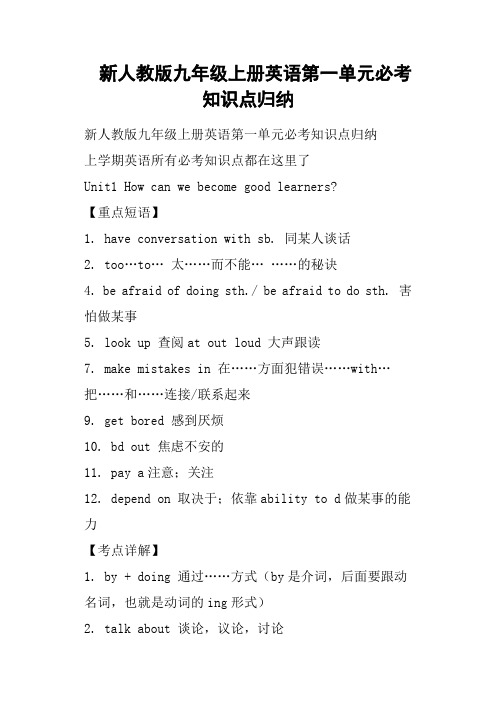
新人教版九年级上册英语第一单元必考知识点归纳新人教版九年级上册英语第一单元必考知识点归纳上学期英语所有必考知识点都在这里了Unit1 How can we become good learners?【重点短语】1. have conversation with sb. 同某人谈话2. too…to… 太……而不能… ……的秘诀4. be afraid of doing sth./ be afraid to do sth. 害怕做某事5. look up 查阅at out loud 大声跟读7. make mistakes in 在……方面犯错误……with… 把……和……连接/联系起来9. get bored 感到厌烦10. bd out 焦虑不安的11. pay a注意;关注12. depend on 取决于;依靠ability to d做某事的能力【考点详解】1. by + doing 通过……方式(by是介词,后面要跟动名词,也就是动词的ing形式)2. talk about 谈论,议论,讨论The studalk about movie after class. 学生们常常在课后讨论电影。
talk to sb= talk with sb 与某人说话3. 提建议的句子:①What/ how about +doing sth.? 做…怎么样?(about 后面要用动词的ing形式,这一点考试考的比较多)如:What/ How about goingg?②Why don't you + do sth.? 你为什么不做…?如:Why don't you gg?③Why not + do sth. ? 为什么不做…?如:Why not gg?④Let's + do sth. 让我们做…...吧。
如: Let's gg⑤Shall we/I + do sth.? 我们/我...…好吗?如:Shall we/I gg?4. a lot 许多,常用于句末。
(精选) 新目标人教版九年级英语上册Unit1全单元知识点归纳
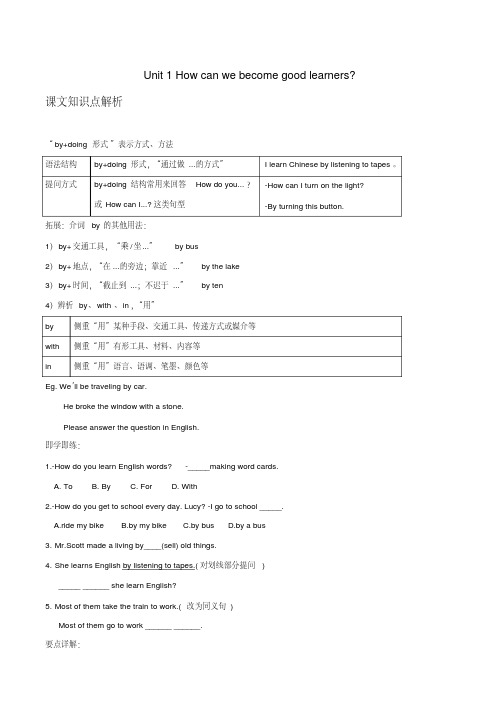
Unit 1 How can we become good learners?课文知识点解析“by+doing形式”表示方式、方法语法结构by+doing形式,“通过做...的方式”I learn Chinese by listening to tapes。
提问方式by+doing结构常用来回答How do you...?或How can I...?这类句型-How can I turn on the light? -By turning this button.拓展:介词by的其他用法:1)by+交通工具,“乘/坐...”by bus2)by+地点,“在...的旁边;靠近...”by the lake3)by+时间,“截止到...;不迟于...”by ten4)辨析by、with、in,“用”by 侧重“用”某种手段、交通工具、传递方式或媒介等with 侧重“用”有形工具、材料、内容等in 侧重“用”语言、语调、笔墨、颜色等Eg. We’ll be traveling by car.He broke the window with a stone.Please answer the question in English.即学即练:1.-How do you learn English words? -_____making word cards.A. ToB. ByC. ForD. With2.-How do you get to school every day. Lucy? -I go to school _____.A.ride my bikeB.by my bikeC.by busD.by a bus3.Mr.Scott made a living by____(sell) old things.4.She learns English by listening to tapes.(对划线部分提问)_____ ______ she learn English?5.Most of them take the train to work.(改为同义句)Most of them go to work ______ ______.要点详解:Section A1.by asking the teacher for help通过向老师求助。
九年级上册1-4英语语法知识点总结
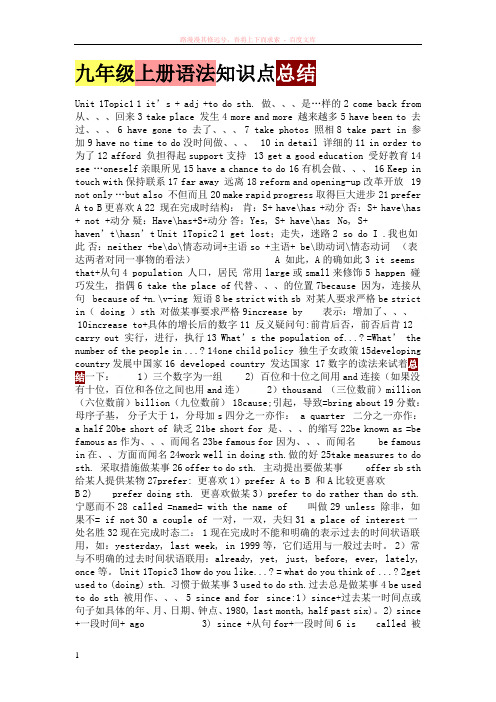
九年级上册语法知识点总结Unit 1Topic11 it’s + adj +to do sth. 做、、、是…样的2 come back from 从、、、回来3 take place 发生4 more and more 越来越多5 have been to 去过、、、6 have gone to 去了、、、7 take photos 照相8 take part in 参加9 have no time to do没时间做、、、10 in detail 详细的11 in order to 为了12 afford 负担得起support支持13 get a good education 受好教育14 see …oneself亲眼所见15 have a chance to do 16有机会做、、、16 Keep in touch with保持联系17 far away 远离18 reform and opening-up改革开放19 not only …but also 不但而且20 make rapid progress取得巨大进步21 prefer A to B更喜欢A 22 现在完成时结构:肯:S+ have\has +动分否:S+ have\has + not +动分疑:Have\has+S+动分答:Yes, S+ have\has No, S+haven’t\hasn’t Unit 1Topic2 1 get lost;走失,迷路2 so do I .我也如此否:neither +be\do\情态动词+主语so +主语+ be\助动词\情态动词(表达两者对同一事物的看法) A 如此,A的确如此3 it seems that+从句4 population 人口,居民常用large或small来修饰5 happen 碰巧发生, 指偶6 take the place of代替、、、的位置7because 因为,连接从句because of +n.\v-ing 短语8 be strict with sb 对某人要求严格be strict in( doing )sth 对做某事要求严格9increase by 表示:增加了、、、10increase to+具体的增长后的数字11 反义疑问句:前肯后否,前否后肯12 carry out 实行,进行,执行13 What’s the population of...? =What’ the number of the people in ...? 14one child policy 独生子女政策15developing country发展中国家16 developed country 发达国家17数字的读法来试着总结一下:1)三个数字为一组2) 百位和十位之间用and连接(如果没有十位,百位和各位之间也用and连)2)thousand (三位数前)million (六位数前)billion(九位数前)18cause;引起,导致=bring about 19分数:母序子基,分子大于1,分母加s 四分之一亦作: a quarter 二分之一亦作:a half 20be short of 缺乏21be short for 是、、、的缩写22be known as =be famous as作为、、、而闻名23be famous for因为、、、而闻名be famous in在、、方面而闻名24work well in doing sth.做的好25take measures to do sth. 采取措施做某事26 offer to do sth. 主动提出要做某事offer sb sth 给某人提供某物27prefer: 更喜欢1)prefer A to B 和A比较更喜欢B 2) prefer doing sth. 更喜欢做某3)prefer to do rather than do sth.宁愿而不28 called =named= with the name of 叫做29 unless 除非,如果不= if not 30 a couple of 一对,一双,夫妇31 a place of interest一处名胜32现在完成时态二:1现在完成时不能和明确的表示过去的时间状语联用,如:yesterday, last week, in 1999等,它们适用与一般过去时。
九年级英语上学期Unit1知识点

九年级英语Unit11. by + doing通过……方式如:by studying with a groupby 还可以表示:“在…旁”、“靠近”、“在…期间”、“用、”“经过”、“乘车”等如:I live by the river.I have to go back by ten o’clock.The thief entered the room by the window.The student went to park by bus.2. talk about 谈论,议论,讨论如:The students often talk about movie after class. 学生们常常在课后讨论电影。
talk to sb. === talk with sb. 与某人说话3. 提建议的句子:①What/ how about +doing sth.?如:What/ How about going shopping?②Why don’t you + do sth.?如:Why don’t you go shopping?③Why not + do sth. ? 如:Why not go shopping?④Let’s + do sth. 如:Let’s go shopping⑤Shall we/ I + do sth.?如:Shall we/ I go shopping?4. a lot 许多常用于句末如:I eat a lot. 我吃了许多。
5. too…to 太…而不能常用的句型too+adj./adv. + to do sth.如:I’m too tired to say anything. 我太累了,什么都不想说。
6. aloud, loud与loudly的用法三个词都与"大声"或"响亮"有关。
①aloud是副词,重点在出声能让人听见,但声音不一定很大,常用在读书或说话上。
初三上册英语第一单元语法知识点

初三上册英语第一单元语法知识点Unit1 Section A1.By:①通过…..方式(途径)。
后跟名词,代词,或者动名词。
He won the game by a lot of practice. 他通过大量的练习赢得比赛。
Tom understand the meaning of the word by looking it upin the dictionary . T om 通过查字典明白了这个单词的含义。
对by提问用how,---How do you study for a test? ---By listening to tapes.你是怎样为考试而学习的?通过听磁带。
②在…..旁边。
例:by the window/the door③乘坐交通工具例:by bus/car④在……之前,到……为止。
例:by October在10月前⑤被例:English is spoken by many people. by 还能够表示:“在…旁”、“靠近”、2. 如:The students often talk about movie after class.学生们常常在课后讨论电影。
3.提建议的句子:①What/ how about +doing sth.? 如:What/ How about going shopping? ②Why don’t you + do sth.? 如:Why don’t you go shopping? ③Whynot + do sth. ? 如:Why not go shopping?④Let’s + do sth. 如:Let’s go shopping ⑤Shall we/ I+ do sth.? 如:Shall we/ I go shopping?多。
a lot 很多,很,非常,在句子中做水准状语,修饰动词,也可修饰形容词副词的比较级, I t rains a lot at this time ofyear. :I eat a lot. 我吃了很多。
九年级英语上册第一单元重要知识点总结

九年级英语上册第一单元重要知识点总结九年级英语上册第一单元重要知识点总结Unit 1一、知识点: 在旅馆的登记入住。
ut: 在旅馆结账离开。
2.By: ①通过…..方式(途径)。
例:I learn English by listening to tapes.②在…..旁边。
例:by the window/the door③乘坐交通工具例:by bus/car④在……之前,到……为止。
例:by October在10月前⑤被例:Englby many people.3.how与what的区别:how通常对方式或程度提问,意思有:怎么样如何,通常用来做状语、表语。
what通常对动作的发出者或接受者提问,意思为什么,通常做宾语,主语。
①How is your summer holiday? It’s OK.(how表示程度做表语)②How did you travel around the world? I travel by air.③What do you learn at school? I learn En glish, math and maubjects.① What……? How…like…?② What…do with…? How…deal with…?③ What…like about…? How…like…?④ What’s the weather like today? How’s the weather today?⑤ What to do? How to do it?e.g. What do youbook?=How do you lbook?I do n’t know what I should do watter.=I don’t know how I should deal w What do you like aboutChina?=How do you la?I don’t know what to do next step?=I don’t know how to do it next step?㊣What good / bad weaday!(weather为不可数名词,其前不能加 a )㊣What a fine / bad daday! (day为可数名词,其前要加 a )4. aloud, loud与loudly的用法: 三个词都与"大声"或"响亮"有关。
九年级上册英语第一单元知识点
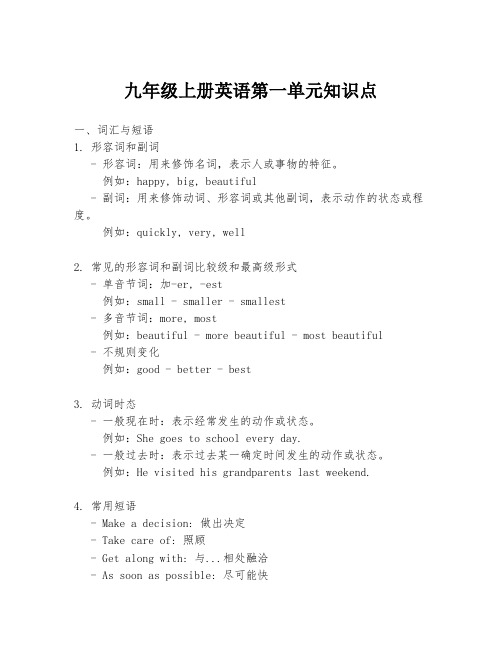
九年级上册英语第一单元知识点一、词汇与短语1. 形容词和副词- 形容词:用来修饰名词,表示人或事物的特征。
例如:happy, big, beautiful- 副词:用来修饰动词、形容词或其他副词,表示动作的状态或程度。
例如:quickly, very, well2. 常见的形容词和副词比较级和最高级形式- 单音节词:加-er, -est例如:small - smaller - smallest- 多音节词:more, most例如:beautiful - more beautiful - most beautiful- 不规则变化例如:good - better - best3. 动词时态- 一般现在时:表示经常发生的动作或状态。
例如:She goes to school every day.- 一般过去时:表示过去某一确定时间发生的动作或状态。
例如:He visited his grandparents last weekend.4. 常用短语- Make a decision: 做出决定- Take care of: 照顾- Get along with: 与...相处融洽- As soon as possible: 尽可能快二、语法点1. 比较级和最高级的构成- 规则变化:形容词和副词的比较级和最高级通常是通过在词尾加上-er和-est构成。
- 不规则变化:一些形容词和副词的比较级和最高级形式是不规则的,需要特别记忆。
- 双重比较级:使用more和less来构成比较级和最高级,适用于多音节和一些单音节形容词。
2. 比较级和最高级的用法- 比较级用于比较两者之间的差别。
例如:My sister is taller than me.- 最高级用于比较三者或三者以上的人或事物。
例如:Tom is the tallest student in our class.3. 时态的使用- 一般现在时通常用于描述习惯性动作或普遍真理。
(完整版)九年级英语上册第一单元知识点总结

九年级英语上册第一单元知识点总结九年级英语上册第一单元知识点总结Unit 1一、知识点: 在旅馆的登记入住。
ut: 在旅馆结账离开。
2.By: ①通过…..方式(途径)。
例:I learn English by listening to tapes.②在…..旁边。
例:by the window/the door③乘坐交通工具例:by bus/car④在……之前,到……为止。
例:by October在10月前⑤被例:Englby many people.3.how与what的区别:how通常对方式或程度提问,意思有:怎么样如何,通常用来做状语、表语。
what通常对动作的发出者或接受者提问,意思为什么,通常做宾语,主语。
①How is your summer holiday? It’s OK.(how表示程度做表语)②How did you travel around the world? I travel by air.③What do you learn at school? I learn English, math and maubjects.① What……? How…like…?② What…do with…? How…deal with…?③ What…like about…? How…like…?④ What’s the weather like today? How’s the weather today?⑤ What to do? How to do it?e.g. What do youbook?=How do you lbook?I don’t know what I should do watter.=I don’t know how I should deal wWhat do you like about China?=How do you la?I don’t know what to do next step?=I don’t know how to do it next step?㊣ What good / bad weaday!(weather为不可数名词,其前不能加 a )㊣ What a fine / bad daday! (day为可数名词,其前要加 a )4. aloud, loud与loudly的用法 : 三个词都与"大声"或"响亮"有关。
九年级英语全一册Unit 1知识点总结
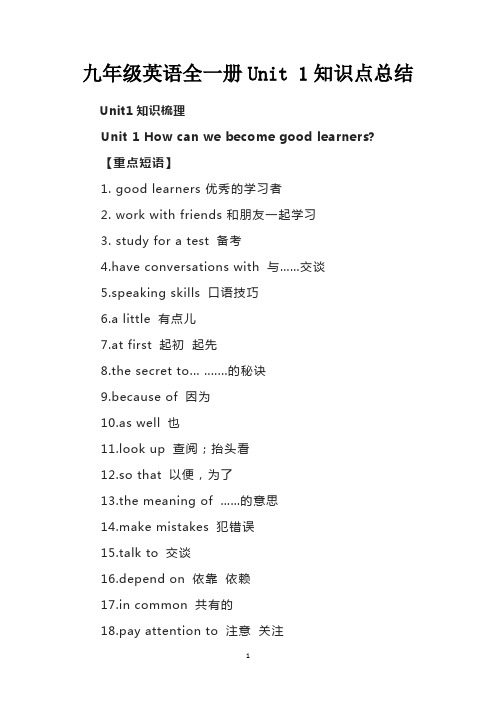
九年级英语全一册Unit 1知识点总结Unit1知识梳理Unit 1 How can we become good learners?【重点短语】1. good learners 优秀的学习者2. work with friends 和朋友一起学习3. study for a test 备考4.have conversations with 与……交谈5.speaking skills 口语技巧6.a little 有点儿7.at first 起初起先8.the secret to... .......的秘诀9.because of 因为10.as well 也11.look up 查阅;抬头看12.so that 以便,为了13.the meaning of ……的意思14.make mistakes 犯错误15.talk to 交谈16.depend on 依靠依赖17.in common 共有的18.pay attention to 注意关注19. connect …with …把……联系20.for example 例如21.think about 考虑22.even if 即使尽管纵容23.look for 寻找24.worry about 担心担忧25.make word cards 制作单词卡片26.ask the teacher for help 向老师求助27.read aloud 大声读28.spoken English 英语口语29.give a report 作报告30.word by word 一字一字地31. so……that 如此……以至于32.fall in love with 爱上33.something interesting 有趣的事情34.take notes 记笔记35.how often 多久一次36.a lot of 许多37.the ability to do sth. 做某事的能力38.learning habits 学习习惯39.be interested in 对……感兴趣40.get bored 感到无聊【重点句型】1.提建议的句子:①What/ how about +doing sth.? 做…怎么样?如:What/ How about going shopping?②Why don't you + do sth.? 你为什么不做…?如:Why don't you go shopping?③Why not + do sth. ? 为什么不做…?如:Why not go shopping?④Let's + do sth. 让我们做…吧。
九年级英语上册第一单元知识点汇总一
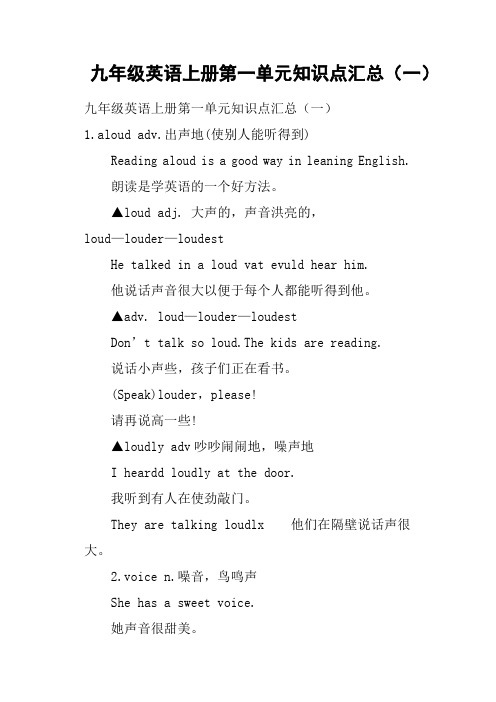
九年级英语上册第一单元知识点汇总(一)九年级英语上册第一单元知识点汇总(一)1.aloud adv.出声地(使别人能听得到)Reading aloud is a good way in leaning English.朗读是学英语的一个好方法。
▲loud adj. 大声的,声音洪亮的,loud—louder—loudestHe talked in a loud vat evuld hear him.他说话声音很大以便于每个人都能听得到他。
▲adv. loud—louder—loudestDon’t talk so loud.The kids are reading.说话小声些,孩子们正在看书。
(Speak)louder,please!请再说高一些!▲loudly adv吵吵闹闹地,噪声地I heardd loudly at the door.我听到有人在使劲敲门。
They are talking loudlx 他们在隔壁说话声很大。
2.voice n.噪音,鸟鸣声She has a sweet voice.她声音很甜美。
She raised her vauld be heard.她提高了嗓音队便于别人能听清楚。
He lvoice./He had no voice becauugh.因为咳嗽,他失声了。
▲noise n噪音,吵闹Don’t make so mu别弄出那么大的噪音。
I heard a strangutside.我听到外边奇怪的声音。
▲sound n.(自然界中的)声音,响声Sound travels slower than light.声音的传播比光慢。
(计算机的)储存器A lad 计算机的储存器能储存很多信息。
▲n.记忆力He has aaar accident.车祸后他的记忆力很差了。
▲n. 回忆,怀念I have a pleasaldhood.我对童年有美好的回忆。
▲/vt. 记住,背过He caw words very quickly.他能很快记住很多单词。
- 1、下载文档前请自行甄别文档内容的完整性,平台不提供额外的编辑、内容补充、找答案等附加服务。
- 2、"仅部分预览"的文档,不可在线预览部分如存在完整性等问题,可反馈申请退款(可完整预览的文档不适用该条件!)。
- 3、如文档侵犯您的权益,请联系客服反馈,我们会尽快为您处理(人工客服工作时间:9:00-18:30)。
九年级英语上册第一单元知识点总结九年级英语上册第一单元知识点总结Unit 1一、知识点: 在旅馆的登记入住。
ut: 在旅馆结账离开。
2.By: ①通过…..方式(途径)。
例:I learn English by listening to tapes.②在…..旁边。
例:by the window/the door③乘坐交通工具例:by bus/car④在……之前,到……为止。
例:by October在10月前⑤被例:Englby many people.3.how与what的区别:how通常对方式或程度提问,意思有:怎么样如何,通常用来做状语、表语。
what通常对动作的发出者或接受者提问,意思为什么,通常做宾语,主语。
①How is your summer holiday? It’s OK.(how表示程度做表语)②How did you travel around the world? I travel by air.③What do you learn at school? I learn English, math and maubjects.① What……? How…like…?② What…do with…? How…deal with…?③ What…like about…? How…like…?④ What’s the weather like today? How’s the weather today?⑤ What to do? How to do it?e.g. What do youbook?=How do you lbook?I don’t know what I should do watter.=I don’t know how I should deal wWhat do you like about China?=How do you la?I don’t know what to do next step?=I don’t know how to do it next step?㊣ What good / bad weaday!(weather为不可数名词,其前不能加 a )㊣ What a fine / bad daday! (day为可数名词,其前要加 a )4. aloud, loud与loudly的用法 : 三个词都与"大声"或"响亮"有关。
①aloud是副词,重点在出声能让人听见,但声音不一定很大,常用在读书或说话上。
通常放在动词之后。
aloud没有比较级形式。
如: He readaloud他朗读那篇故事给他儿子听。
②loud可作形容词或副词。
用作副词时,常与speak, talk, laugh等动词连用,多用于比较级,须放在动词之后。
如:ld uak a little louder. 她让我们说大声一点。
③loudly是副词,与loud同义,有时两者可替换使用,但往往含有令人讨厌或打扰别人的意思,可位于动词之前或之后。
如:He dalk loudly or laugh loudly in public. 他不当众大声谈笑。
5. voice 指人的嗓音也指鸟鸣。
sound 指人可以听到的各种声音。
指噪音、吵闹声6. find + 宾语 + 宾补(名词形容词介词短语分词等)例:I finddly. I found him workinggarden.We foundbed. He found the window closed.We found常见的系动词有:①是:am 、is、 are②保持:keep、 stay③ 转变:become、 get、 turn④ ……起来 feel、 look、 smell、 taste、 sound8. get + 宾语+宾补(形容词过去分词动词不定式)使某种情况发生例:Glean. 把鞋擦干净Get Mr. G让格林先生进来I want to get my bike repaired. 我想去修自行车You can’t get him waiting. 你不能让他老等着9. 动词不定式做定语①与所修饰的名词构成主谓关系The next train to arrive was from New York. He is alwa②与所修饰的名词构成动宾关系I havg to say. I need awrite with.I need some paper to wI don’t have alive in.10. praun 做名词为不可数名词11. add 补充说又说12. join 加入某团体并成为其中一员 attend 出席参加会议或讲座与take part in指参加到某项活动中去。
13.all、 both、 always以及every复合词与not连用构成部分否定。
其完全否定为:all---none,both---verything---nothing, everybody---nobody. 14. be afraid of doing sth. / sth.害怕 be afraid of being alonebe afraid to do sth.害怕be afraid that恐怕担心,表示委婉语气:①放在否定句末表示“也”②两者中的“任一”③either…or…或者…或者.…引导主语部分,谓语动词按照就近原则lete完成,是个较正式的词,后不能接动名词指日常事物的完成17.a,an 与序数词连用表示“又一”,“再一”。
例:Please give me a second apple. Ta fifth girl.18.have trouble/difficult/problem (in) doing….. 干…..遇到麻烦,困难19.unless 除非,如果不,等于“if not”本身就表示否定,引导条件状语从句,主句为将来时,条件状语从句用一般现在时表示将来。
例:My babdoesn’t cry unless she’s hungbabdoesn’’t hungry.Unless you taare, you’ll have an accident.如果你不多加小心的话,你会出事的。
20.instead: adv. 代替,更换。
例:We havwould you like tea instead?我们没有咖啡了,改喝茶好吗?It will take days by car, so let’s fly instead.开车去要好几天呢,咱们还是坐飞机吧。
Tom was ill, so I wad.汤姆病了,所以换了我去。
instead of doing sth. 作为某人或某事物的替换例:Let’s play cards instead of watching TV.Waad of potatoes.Givdadg2口头的,口语的。
glish 口头英语speaking 讲话的,说某种语言的。
Speaking skills讲英语的能力22. 提建议的句子:①What/ how about +doing sth.? 如:What/ How about goingg?②Why don’t you + do sth.? 如:Why don’t you gg?③Why not + do sth. ? 如:Why not gg?④Let’s + do sth. 如:Let’s gg⑤Shall we/ I + do sth.? 如:Shall we/ I gg?23. a lot 许多常用于句末如:I eat a lot. 我吃了许多。
24. too…to 太…而不能常用的句型 too+adj./adv. + to d如:I’d to say anything. 我太累了,什么都不想说。
25. not …at all 一点也不根本不如:I like milk very much. I don’t lat all.我非常喜欢牛奶。
我一点也不喜欢咖啡。
not经常可以和助动词结合在一起,at all 则放在句尾26.be / get excited aboube / get excited about doingbe excited to do sth. 对…感兴奋如:I am / get excited about going to Beijing.===I am excited to go to Beijing. 我对去北京感到兴奋。
27. ① end up doing sth 终止做某事,结束做某事如: The party ended up singing. 晚会以唱歌而结束。
② end up w以…结束如:The party ended up wging. 晚会以她的歌唱而告终。
2all 首先. to begin with 一开始later on 后来、随29. also 也、而且(用于肯定句)常在句子的中间也(用于否定句)常在句末too 也 (用于肯定句) 常在句末=as well30. make mistakes 犯错mistake sb. for …把……错认为……make mistakes (in) doing sth. 在干某事方面出错by mistake 错误地;由于搞错mistake---mistook----mistaken如:Iake mistakes. 我经常犯错。
Ibrother.我错把他认成了他的哥哥。
make a mistake 犯一个错误如: I have made a mistake. 我已经犯了一个错误。
31. laugh at sb. 笑话;取笑(某人)如:Don’t laugh at me!不要取笑我!32. ta做笔记,做记录doing sth . 喜欢做…乐意做… 如:laying football. 她喜欢踢足球。
lf 过得愉快如:Hd himself. 他过得愉快。
34. native speaker 说本族语的人+(the+ 形容词比较级)+名词复数形式…其中之一如:ular teachers. 她是最受欢迎的教师之一。
36. It’s +形容词+(for sb. ) to do sth. (对于某人来说)做某事…如:It’s difficult (for me ) to study English.对于我来说学习英语太难了。
句中的it 是形式主语,真正的主语是to study Englactice doing 练习做某事如:aaking English. 她经常练习说英语。
